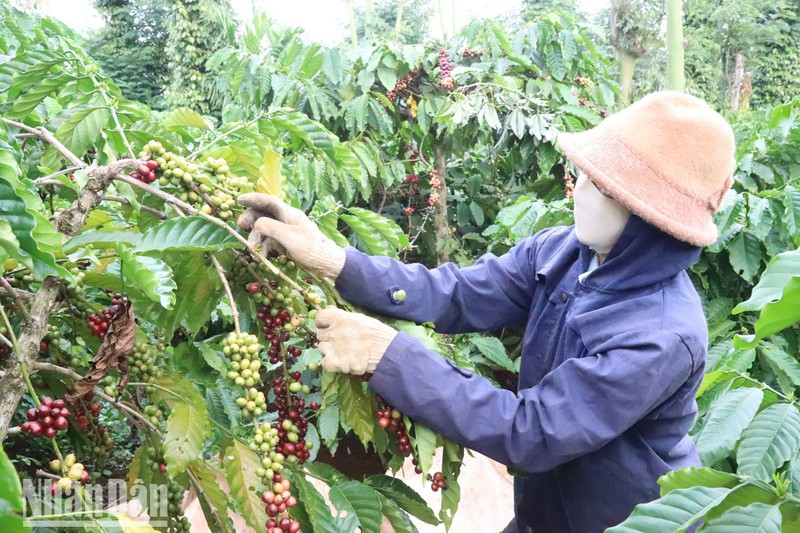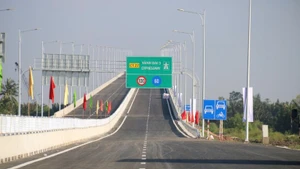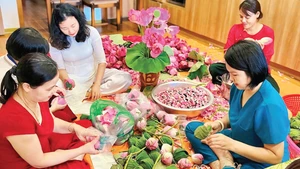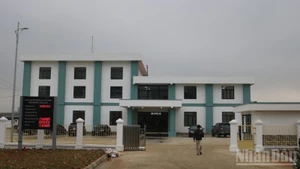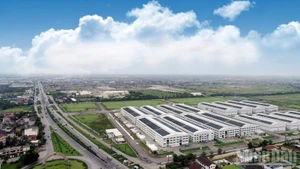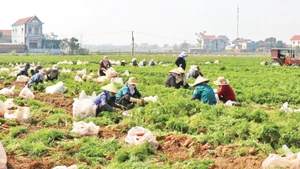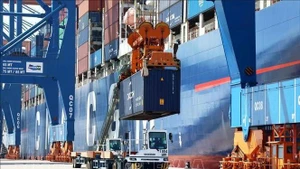According to Nguyen Quoc Manh, Deputy Director of the Department of Crop Production under the Ministry of Agriculture and Rural Development (MARD), the total coffee growing area in Vietnam was 715,300 hectares as of 2023, producing 1.89 million tonnes of coffee beans.
Coffee is now a key crop in many localities, creating stable jobs for more than one million workers.
Vietnamese coffee has also affirmed its brand and value with its presence in many markets. In 2023, Vietnam’s coffee export volume reached 1.623 million tonnes, with revenue of 4.24 billion USD, the highest figure in the past ten years.
With a view for sustainable development and enhancing the value of coffee, many localities have developed cultivation zones employing advanced technologies such as planting new cultivars, combining drip irrigation and fertilisation, measuring the content of sugar in ripen coffee beans, and using internet-based automatic weather monitoring systems to access data for production.
Coffee trading and processing companies and farmers also work together to ensure stable income and output. Through the linkage, new technologies are transferred to farmers to help them enhance their coffee cultivation level.
Dak Lak Province has 212,000 hectares of coffee, which has been determined as a key crop. Coffee is currently earning a high selling price, helping to raise the income of farmers.
In recent years, farmers in Ea H’leo District have proactively employed new technologies in coffee cultivation to enhance the productivity, quality and value of this key crop. Vice Chairman of Ea H’leo District Pham Van Khoi said the district currently has 30,000 hectares of coffee, with an average output of 3.5 tonnes per hectare, generating revenue of 270 million VND (10,600 USD) per hectare.
To promote sustainable and responsible coffee production and enhance the income of farmers, Ea H’leo District is piloting a project to provide agricultural services for sustainable coffee development in Ea Hiao Commune, with the participation of 3,633 households across a total area of 4,360 hectares.
As of the end of 2023, the project provided training for 14,563 farmers on topics such as sustainable and responsible production, replanting techniques, intercropping, and coffee processing. The project also provided farmers with seedlings, helped them replant 550 hectares, and installed drip irrigation systems.
According to Dak Nong’s agricultural extension centre, the province has four key crops: coffee, black pepper, cashew, and rubber. The total coffee growing area covers 140,000 hectares with an annual output of 240,000 tonnes. The coffee sector is creating jobs for 105,000 people and generates annual revenue of 400 million USD.
Under a plan to develop key industrial-use crops until 2030, MARD aims to raise the total coffee cultivation area to 640,000-660,000 hectares, with a coffee bean output of 1.8-2 million tonnes. The Central Highlands region will account for 600,000 hectares, while the remaining 40,000-60,000 hectares are distributed in the provinces of Binh Phuoc, Dong Nai, Ba Ria-Vung Tau, Son La, Quang Tri and Binh Thuan. Robusta coffee accounts for about 90-92% and arabica coffee makes up 8-10%.
To realise the abovementioned goals, localities need to switch to other crops in places where coffee plants are not suitable, continue replanting aging coffee trees, and use new cultivars that produce higher yields and can resist pests. They should also strive to have 80-90% of new coffee cultivation areas using the right cultivars by 2030 and to have more than 70% of the total area granted with traceable planting area codes.
In addition, local authorities should encourage enterprises to invest in new technologies to produce roasted coffee that meet domestic and international demands; and research and develop processing technologies to maximise the use of coffee by-products.
